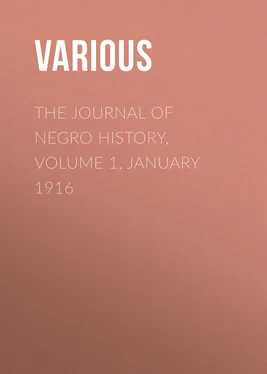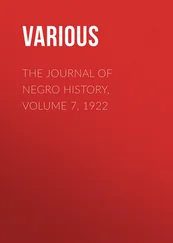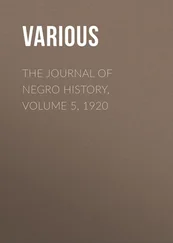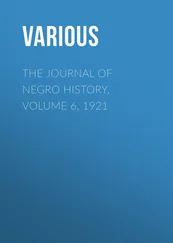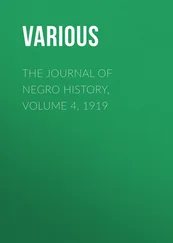Various - The Journal of Negro History, Volume 1, January 1916
Здесь есть возможность читать онлайн «Various - The Journal of Negro History, Volume 1, January 1916» — ознакомительный отрывок электронной книги совершенно бесплатно, а после прочтения отрывка купить полную версию. В некоторых случаях можно слушать аудио, скачать через торрент в формате fb2 и присутствует краткое содержание. Жанр: foreign_antique, periodic, История, foreign_edu, на английском языке. Описание произведения, (предисловие) а так же отзывы посетителей доступны на портале библиотеки ЛибКат.
- Название:The Journal of Negro History, Volume 1, January 1916
- Автор:
- Жанр:
- Год:неизвестен
- ISBN:нет данных
- Рейтинг книги:5 / 5. Голосов: 1
-
Избранное:Добавить в избранное
- Отзывы:
-
Ваша оценка:
- 100
- 1
- 2
- 3
- 4
- 5
The Journal of Negro History, Volume 1, January 1916: краткое содержание, описание и аннотация
Предлагаем к чтению аннотацию, описание, краткое содержание или предисловие (зависит от того, что написал сам автор книги «The Journal of Negro History, Volume 1, January 1916»). Если вы не нашли необходимую информацию о книге — напишите в комментариях, мы постараемся отыскать её.
The Journal of Negro History, Volume 1, January 1916 — читать онлайн ознакомительный отрывок
Ниже представлен текст книги, разбитый по страницам. Система сохранения места последней прочитанной страницы, позволяет с удобством читать онлайн бесплатно книгу «The Journal of Negro History, Volume 1, January 1916», без необходимости каждый раз заново искать на чём Вы остановились. Поставьте закладку, и сможете в любой момент перейти на страницу, на которой закончили чтение.
Интервал:
Закладка:
Of these facts most modern historians know but little and Negroes in general almost nothing. For example, how many have ever heard of Al-Bekri, the Arab writer, who in the eleventh century wrote a description of the Western Sudan of such importance that it gained him the title of "The Historian of Negro Land"? How much, by means of research, might be learned of the town of Ghana situate on the banks of the Niger, which the historian Al-Bekri described as a meeting place for commercial caravans from all parts of the world? This town, he said, contained schools and centers of learning. It was the resort of the learned, the rich, and the pious of all nations. Likewise, most of us have never heard perhaps of another Arab writer, Iben Khaldun, who in writing about the middle of the fourteenth century of Melle, another of the kingdoms of the Sudan, reported that caravans from Egypt consisting of twelve thousand laden camels passed every year through one town on the eastern border of the empire on their way to the capital of the nation. The load of a camel was three hundred pounds. 12,000 camel loads amounted, therefore, to something like 1,600 tons of merchandise. At this time we are told that there was probably not a ship in any of the merchant navies of the world which could carry one hundred tons. 250 years later the average tonnage of the vessels of Spain was 300 tons and that of the English much less. The largest ship which Queen Elizabeth had in her navy, the Great Mary , had a capacity of a thousand tons; but it was considered an exception and the marvel of the age.
Another thing that is not generally known is the importance to which some of these Negro kingdoms of the Western Sudan attained during the middle ages and the first centuries of the modern era. In size and permanency they compared favorably with the most advanced nations of Europe. The kingdom of Melle of which the historian, Iben Khaldun, wrote, had an area of over 1,000 miles in extent and existed for 250 years. It was the first of the kingdoms of the Western Sudan to be received on equal terms with the contemporary white nations. The greatest of all the Sudan states was the kingdom of Songhay which, in its golden age, had an area almost equal to that of the United States and existed from about 750 A.D. to 1591. There is a record of the kings of Songhay in regular succession for almost 900 years. The length of the life of the Songhay empire coincides almost exactly with the life of Rome from its foundation as a republic to its downfall as an empire.
The greatest evidences of the high state of civilization which the Sudan had in the fourteenth and fifteenth centuries were the attention that was paid to education and the unusual amount of learning that existed there. The university of Sankore at Timbuctu was a very active center of learning. It was in correspondence with the universities of North Africa and Egypt. It was in touch with the universities of Spain. In the sixteenth century Timbuctu had a large learned class living at ease and busily occupied with the elucidation of intellectual and religious problems. The town swarmed with students. Law, literature, grammar, theology and the natural sciences were studied. The city of Melle had a regular school of science. One distinguished geographer is mentioned, and allusions to surgical science show that the old maxim of the Arabian schools, "He who studies anatomy pleases God," was not forgotten. One of these writers mentions that his brother came from Jenne to Timbuctu to undergo an operation for cataract of the eyes at the hands of a celebrated surgeon there. It is said that the operation was wholly successful. The appearance of comets, so amazing to Europe of the Middle Ages and at the present time to the ignorant, was by these learned blacks noted calmly as a matter of scientific interest. Earthquakes and eclipses excited no great surprise.
The renowned writer of the Sudan was Abdurrahman Essadi. He was born in Timbuctu in 1596. He came of learned and distinguished ancestors. He is chief author of the history of Sudan. The book is said to be a wonderful document. The narrative deals mainly with the modern history of the Songhay Empire, and relates the rise of this black civilization through the fifteenth and sixteenth centuries and its decadence up to the middle of the seventeenth century. The noted traveller, Barth, was of the opinion that the book forms one of the most important additions that the present age has made to the history of mankind. The work is especially valuable for the unconscious light which it throws upon the life, manners, politics, and literature of the country. It presents a vivid picture of the character of the men with whom it deals. It is sometimes called the Epic of the Sudan.
From this brief sketch which I have given of the African in ancient and medieval times it is clear that Negroes should not despise the rock from which they were hewn. As a race they have a past which is full of interest. It is worthy of serious study. From it we can draw inspiration; for it appears that not all black men everywhere throughout the ages have been "hewers of wood and drawers of water." On the contrary, through long periods of time there were powerful black nations which have left the records of their achievements and of which we are just now beginning to learn a little. This little, however, which we have learned teaches us that the Negroes of today should work and strive. Along their own special line and in their own peculiar way they should endeavor to make contributions to civilization. Their achievements can be such that once more black will be dignified and the fame of Ethiopia again spread throughout the world.
Monroe N. WorkThe Mind of the African Negro as Reflected in His Proverbs
As a study of folk literature of different races offers one way of understanding their mental attitude toward life and its problems, the folk literature of the Negro will reveal to us his inherent moral and intellectual bias and the natural trend of his philosophy. Let us therefore examine some phases of this subject, paying particular attention to that part which relates especially to the proverbs. The sources of such literature are abundant. A little research in a well-equipped library brings one into a curious and informing mass of knowledge, ever increasing in bulk, in the French, German and English languages, as well as in many strange and highly inflected African tongues.
A cursory reading of this literature discloses at once that our general knowledge of Africa has been based in the past mainly on those external facts that strike the sense of sight, such as the physical appearance of the population, native dress and handiwork, musical instruments, implements of warfare, and customs peculiar to the social and religious life of the people. Only through the folk literature, however, can we get a glimpse of the working of the mind of the African Negro. Professor Henry Drummond, although he had traveled in Africa and had written at length about it, still exhibited a longing for this insight when he observed: "I have often wished that I could get inside of an African for an afternoon and just see how he looked at things." At that time much of the folk literature of that continent was not as now available. A deeper and more extensive reading of it at present strengthens our belief in the ancient saying "Out of Africa there is always something new," a rather disquieting thought, if we have reached the conclusion that native culture on that continent has never risen above the zero point.
A critical examination of the content of this folk literature will result in a division somewhat similar to that found in the same type of literature of other races. Such a division discloses stories, poetry, riddles and proverbs. The African folk literature is especially rich in proverbs. So numerous are these proverbs that it has been said that there is scarcely an object presented to the eye, scarcely an idea excited in the mind, but it is accompanied by some sententious aphorism, founded on close observation of man and animals and in many cases of a decidedly moral tendency. Lord Bacon remarked many years ago that "the genius, wit and spirit of a nation are discovered in its proverbs." Cervantes in Don Quixote says "Methinks, Sancho, that there is no proverb that is not true, because they are all judgments drawn from the same experience which is the mother of all knowledge." If these sayings be true, then the proverbs of the African Negro should be examined in order to see if they approach these observations.
Читать дальшеИнтервал:
Закладка:
Похожие книги на «The Journal of Negro History, Volume 1, January 1916»
Представляем Вашему вниманию похожие книги на «The Journal of Negro History, Volume 1, January 1916» списком для выбора. Мы отобрали схожую по названию и смыслу литературу в надежде предоставить читателям больше вариантов отыскать новые, интересные, ещё непрочитанные произведения.
Обсуждение, отзывы о книге «The Journal of Negro History, Volume 1, January 1916» и просто собственные мнения читателей. Оставьте ваши комментарии, напишите, что Вы думаете о произведении, его смысле или главных героях. Укажите что конкретно понравилось, а что нет, и почему Вы так считаете.
